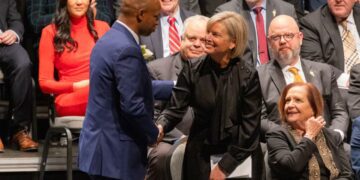By Theresa J. Jacobs- Raborn, GOP candidate for IL's 2nd CD -
Christianity and The Bible played a fundamental role in United States education until the early 1900s. It was part of the fabric of education, childhood, adult life, and government.
Before we dive into the arguments for and against the Bible being taught in public schools, let’s look at the numbers:
The Numbers
The vast majority of Americans claim to be Christian. How big of a majority do Christians have in the United States? According to PBS, it’s nearly 70%, in September 2017[1].
According to The Pew Research Center, 46% of Americans are some form Protestant, 21% are Catholic, 2% are Mormon, and 2% are Other Christian[2]. This comes to 71% of Americans. However, there are two other groups to add in with the Christians. The Old Testament of the Christian Bible is part of the sacred texts for Jewish people[3], who make up 2% of the American population.2
The other religion that is very closely aligned with Christianity is Islam. Islam has more than one sacred text and significant portions of the Bible, namely the first Five books of the Old Testament and the first Four books of the New Testament.[4] Therefore, study of the Bible, or at least portions of the Bible are common among the three major religions in the United States. According to the Pew Research Center, Muslims make up 1% of Americans. When you add this to the Christians and Jews, you have 74% of Americans belong to a religion that hold the Bible, or parts of the Bible, as being part of their sacred texts.
With this overwhelming majority of Americans viewing the Bible as sacred, why can’t we teach it in public schools? Teaching the Bible does not establish a national religion because The Bible encompasses three different religions. And there are variations within each of those religions.
Also, I find it odd that with 74% of Americans believing in the Bible, or part of it, that parents who want some kind of religious education are forced to have to pay for private education. Instead, it should be the other way around. Since the majority of Americans belong to one of those three faiths, then teaching the Bible in public school would be in line with the majority of students. However, if a parent does not want his or her child to receive a Biblical education, that parent should be the one to pay for private, secular education. Public school should provide the most benefit to the vast majority of American families, not cater to the minority voices in the American landscape.
“Separation of Church and State”
Now, we can certainly get into a “separation of church and state” debate, but that would be futile, not for the 74% of Bible believing Americans, but for the secularists. Teaching the Bible does not establish a national religion, because of its uniformity among three very different religions. To determine if America is establishing a national religion, you have to define which religion it is “establishing”. With three major religions (Christianity, Judaism, and Islam) being represented by the study of the Bible (or parts thereof), no one can definitively claim the “establishment” of any one of those three.
Although the phrase “separation of church and state” is part of the modern American lexicon, it is NOT a phrase in the United States Constitution. However, the United States Constitution does state, “Congress shall make no law respecting an establishment of religion, or prohibiting the free exercise thereof…” in the First Amendment. Most people get hung up by the “establishment of religion” part and forget about the “prohibiting the free exercise thereof” part. Congress is NOT allowed to prohibit the expression of religion. Therefore, Congress cannot suppress religion from the public arena.
Additionally, it is easy to dispute the argument that teaching the Bible is public school is forcing religion on the students. It astounds me that more people are not disputing this! As science has gotten better at conducting more sensitive experiments and people have been able to conduct more and more archeological research, the Bible is being proven right on historical accounts and science. An interesting read is “101 Scientific Facts & Foreknowledge”.[5] Even if you dispute the authenticity of the Bible, no one can dispute that the Bible is one of the greatest literary works ever created.
The Bible as Great Literature
If we are teaching fictional stories such as “To Kill a Mockingbird”, “Catcher in the Rye”, “Pride and Prejudice”, “Wuthering Heights”, “Moby-Dick”, “The Tale of Peter Rabbit”, “Charlotte’s Web”, and much more, why would we not teach the greatest literature work of all time – the Bible. The Bible has every aspect of great literature. Even if you do not believe that the Bible is the inspired word of a single Creator, you cannot dispute the beauty in its poetry and songs, the lessons in the various parables, the manual for peaceful personal relationships, the great adventures described, and even the great miracles which are detailed in the Bible. We let children read about talking pigs and wizard schools, but go bonkers at the mere mention that there may have been a great flood that covered the whole Earth.
Even the most aggressive atheist has to admit that the quality of literature contained in the Bible is remarkable; rivaling any other great work of fiction. So, either you believe, as 74% of Americans believe, that the Bible is divinely inspired by our Creator, or you believe that it is one of the greatest works of fiction. Either way, it has great value in the classroom.
Morality and Life Lessons
Even if you do not believe that the Bible is divinely inspired, you cannot dispute that the Bible is a great guide to human life. It provides us with the greatest rules for moral and peaceful living. It talks about how to live, how to conduct business, how courts should function, how men and women should treat each other with respect, how parents and children should treat each other, how to keep our bodies healthy, and so much more.
We often say that babies do not come with instruction manuals. But, the Bible makes a great instruction manual for peaceful human life. It is in the Bible that we were first introduced to the concepts of freedom, liberty, and justice. Many of our laws come directly from the Bible. In Proverbs 22:22, we are told, “Do not exploit the poor because they are poor and do not crush the needy in court.” This sounds a lot like our Miranda Warnings that are given during an arrest (“You have the right to an attorney. If you cannot afford one, one will be appointed to you.”). That is only one tiny example of our laws mimicking the Bible’s laws and rules. There are so many more.
We want our children to respect authority. The Bible is full of lessons that teach that. However, respecting authority does not mean always obeying without question. Obviously, there are limits to obeying authority. But, we must always respect authority. That may seem like an oxymoron, but it is not. Respect does not mean obey. I can respect my parents’ opinion, even if I decide not to take their advice or direction. You may disagree with my opinion, but as long as you allow me to voice that opinion and you speak to me calmly, you are respecting me. The Bible teaches respect for others and how we can show respect to others. Conflict arises when respect is lost. The Bible shows us how to respect each other and live together peacefully.
Final Thoughts
Teaching the Bible in public schools has a great value to society. With a super majority of Americans believing that the Bible is Divinely inspired by our Creator, coupled with the fact that the Bible is a collection of great literature, and the lessons it contains for morality and peaceful coexistence with our fellow humans, it is nearly impossible to dispute the value the Bible has in society and in the hearts and minds of our children. Our children need this guiding tool to help them navigate this world, which is often fraught with complications and confusion. The basic principles taught throughout the Bible are the best guidance, for human life, ever written. We would be remiss to deny our children this great book in the course of their education.
[1] Public Broadcasting Station (PBS), Zoll, Rachel (Associated Pres), White Christians Are Now a Minority of the U.S. Population, Survey Says, September 6, 2017, https://www.pbs.org/newshour/nation/white-christians-now-minority-u-s-population-survey-says, retrieved May 5, 2018.
[2] Pew Research Center, Alper, Becka & Sandstrom, Aleksandra, If the U.S. had 100 People: Charting Americans’ Religious Affiliations, November 14, 2016, http://www.pewresearch.org/fact-tank/2016/11/14/if-the-u-s-had-100-people-charting-americans-religious-affiliations/, retrieved May 5, 2018.
[3] The International Bible Society, Do Jews and Christians Have the Same Religion?, https://www.biblica.com/resources/bible-faqs/do-jews-and-christians-basically-have-the-same-religion/, retrieved May 5, 2018.
[4] Talk to Islam, Do Muslims Believe in the Bible?, http://talktoislam.com/39/do-muslims-believe-in-the-bible, retrieved May 5, 2018.
[5] Eternal Productions, 101 Scientific Facts & Foreknowledge, http://www.eternal-productions.org/101science.html, citing multiple sources including John Hopkins Institute and Pacific Health Center, retrieved May 6, 2018.
Theresa J. Jacobs-Raborn is a Republican 2020 candidate for Illinois' 2nd Congressional District.







